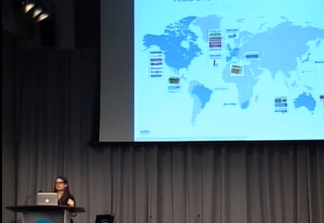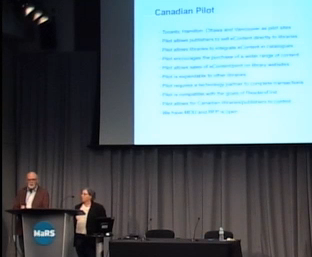 Things have come a long way for e-singles over the past year. At last year’s Tech Forum, we heard from Laura Hazard Owen of paidContent about the American market for e-singles and then The Atavist talked about their business model. Since then, more Canadian companies have entered the e-singles fray, all trying different tactics in an effort to explore the possibilities of this growing market.
Things have come a long way for e-singles over the past year. At last year’s Tech Forum, we heard from Laura Hazard Owen of paidContent about the American market for e-singles and then The Atavist talked about their business model. Since then, more Canadian companies have entered the e-singles fray, all trying different tactics in an effort to explore the possibilities of this growing market.
Global Ebook Domination through Better Metadata
 Kobo’s Ashleigh Gardner gave an information-packed workshop at Technology Forum 2013 that covered some important tips and trends for selling ebooks internationally. In this video you’ll learn some pricing basics and how to ensure your ONIX records have all the information necessary to sell your books into as many territories as possible. And you’ll also get country-by-country pricing trends and tax structure tips that will help inform the decisions involved in selling your ebooks worldwide.
Kobo’s Ashleigh Gardner gave an information-packed workshop at Technology Forum 2013 that covered some important tips and trends for selling ebooks internationally. In this video you’ll learn some pricing basics and how to ensure your ONIX records have all the information necessary to sell your books into as many territories as possible. And you’ll also get country-by-country pricing trends and tax structure tips that will help inform the decisions involved in selling your ebooks worldwide.
What Canadians Think About Canadian Books
The State of E-Lending in Canada
 This year, at Technology Forum we spent some time getting to know our librarian partners better. We shared information and found new ways to collaborate. This is why I brought Susan Renouf and Ken Roberts in to give an information session on March 6th about the state of e-lending in Canada.
This year, at Technology Forum we spent some time getting to know our librarian partners better. We shared information and found new ways to collaborate. This is why I brought Susan Renouf and Ken Roberts in to give an information session on March 6th about the state of e-lending in Canada.
Future-Proofing Publishing
 This year, Technology Forum 2013 closed on a particularly inspiring and energized note with Robert Wheaton’s presentation called “Future-Proofing Publishing: Lightweight Technologies Publishers Should Be Watching Right Now”. Robert is VP of Strategic Digital Business Development at Random House of Canada and the fearless leader of the Hazlitt team. His background in inventory management at Indigo and web development in the arts gives him a unique perspective. He has a vision for publishers and on March 7th, he had attractively packaged it in an Indiana Jones metaphor.
This year, Technology Forum 2013 closed on a particularly inspiring and energized note with Robert Wheaton’s presentation called “Future-Proofing Publishing: Lightweight Technologies Publishers Should Be Watching Right Now”. Robert is VP of Strategic Digital Business Development at Random House of Canada and the fearless leader of the Hazlitt team. His background in inventory management at Indigo and web development in the arts gives him a unique perspective. He has a vision for publishers and on March 7th, he had attractively packaged it in an Indiana Jones metaphor.
Opportunities in Self-Publishing
 Self-publishing has always suffered from PR problems, but its days as the ugly duckling of the publishing world are numbered. Readers are showing a willingness to buy titles from no-name imprints, and it’s becoming more common to hear about traditionally published authors making the choice to go the self-publishing route.
Self-publishing has always suffered from PR problems, but its days as the ugly duckling of the publishing world are numbered. Readers are showing a willingness to buy titles from no-name imprints, and it’s becoming more common to hear about traditionally published authors making the choice to go the self-publishing route.
How Do Canadians Spend Their Free Time?
 BookNet Canada has fielded a consumer panel in February for the last two years. The results from the panel are used to help inform the data we collect for our study, The Canadian Book Consumer. In the general consumer questionnaire, we ask approximately 750 English-speaking Canadians from across the country how they spend their leisure time, how much time they spend per day on those leisure activities, and, this year, what mobile devices they own (at least the ones that could potentially be used for e-reading).
BookNet Canada has fielded a consumer panel in February for the last two years. The results from the panel are used to help inform the data we collect for our study, The Canadian Book Consumer. In the general consumer questionnaire, we ask approximately 750 English-speaking Canadians from across the country how they spend their leisure time, how much time they spend per day on those leisure activities, and, this year, what mobile devices they own (at least the ones that could potentially be used for e-reading).
CMPTO Considers Digital Content Options
 Last week’s CMPTO meetup was all about going digital, but not in an EPUB sense. As multimedia continues to grow and expand, so do the expectations of the people who consume it. Last Wednesday night we had three fantastic speakers, all of whom were able to shed some light on how publishers might begin to view the new digital landscape and what “going digital” means to each of them.
Last week’s CMPTO meetup was all about going digital, but not in an EPUB sense. As multimedia continues to grow and expand, so do the expectations of the people who consume it. Last Wednesday night we had three fantastic speakers, all of whom were able to shed some light on how publishers might begin to view the new digital landscape and what “going digital” means to each of them.
Tools of Change 2013 Wrap-Up
 I spent last week at O’Reilly’s Tools of Change conference in New York getting wise to what publishers, authors, and publishing service providers are thinking about when they look at the road ahead for the book industry. A theme that really stood out for me was one of sharing. What challenges do we face with different types of sharing and what ideas do people have about them? I’d like to focus on some talks that certainly did their bit in answering this question.
I spent last week at O’Reilly’s Tools of Change conference in New York getting wise to what publishers, authors, and publishing service providers are thinking about when they look at the road ahead for the book industry. A theme that really stood out for me was one of sharing. What challenges do we face with different types of sharing and what ideas do people have about them? I’d like to focus on some talks that certainly did their bit in answering this question.



